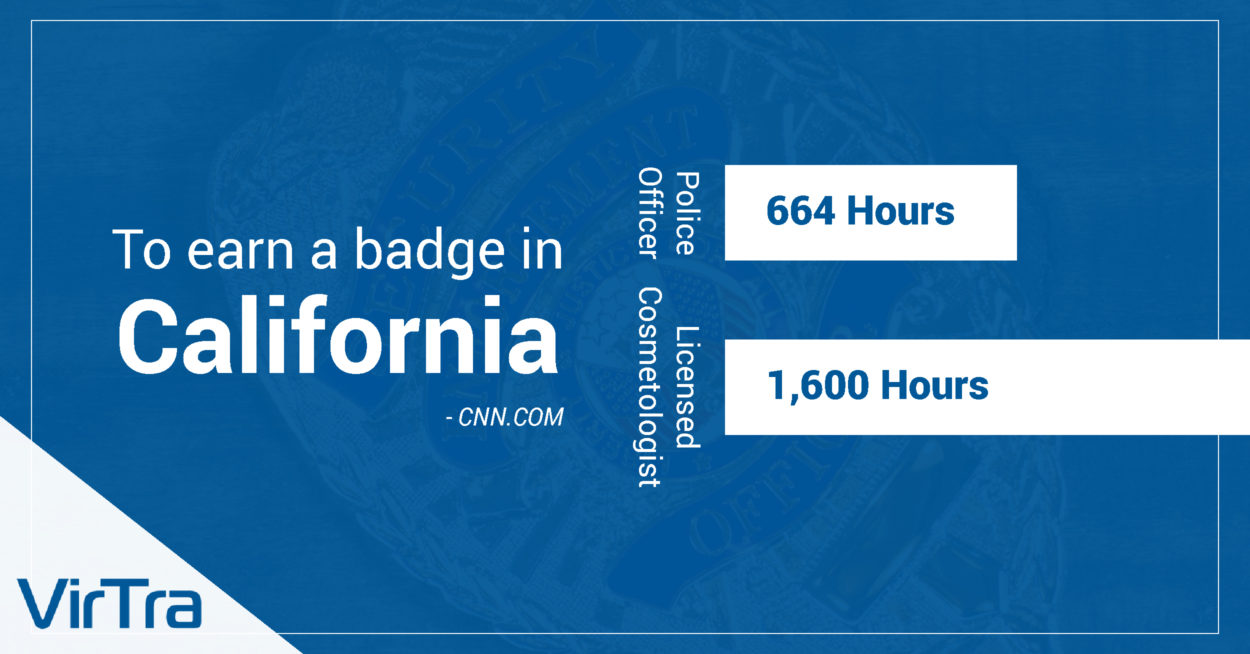
Do barbers & Cosmetologists need more training than police?
Individuals in almost any profession must be properly trained if they are to do their jobs well, safely, and legally. For example, a cosmetologist in California must undergo approximately 1,000 hours of training. However, in that same state, a law enforcement officer—one who has permission to wield and utilize deadly weapons—requires only 664 training hours. For many, this is an obvious issue that needs to be immediately addressed.
The Startling Reality of Police Training Hours
Although it is difficult to believe an individual needs more training time to provide manicuring services than legally pointing a weapon at a suspect, it is true and startling. Do barbers & Cosmetologists need more training than police? What is more startling is that California is not the only state requiring fewer law enforcement training hours than other professions:
- North Carolina –Barbers need 1,520 hours of training; police officers only need 620.
- California – Licensed cosmetologists need 1,000 hours of training; police officers in training need 664.
- Florida – Interior designers must have 1,760 hours of training, but police officers only need 770.
- Massachusetts – Licensed HVAC technicians need 1,000 hours of training and policemen need 900.
- Michigan –Licensed electric sign specialists need 4,000 hours of training; policemen need 594.
- Louisiana –Manicurists need 500 hours of training while police officers in training only need 360.
The Obvious Problem for Officers
Law enforcement officers find themselves in a variety of difficult situations each shift. Even traffic cops—those simply stopping people for speeding or failing to stop completely at stop signs—put themselves in potentially deadly situations every day. The sheer number of police-involved deaths is overwhelming, yet this number continues to climb each year.
Do barbers and Cosmetologists need more training than police? It makes sense that law enforcement training should be just as extensive and thorough—if not more so—than the training it takes to become a licensed interior designer. However, for many states, this is not the case. People nationwide argue that something should be done to change this.
Decreasing Risk with Supplemental and Ongoing Police Training Hours
Although it is true that law enforcement officers require significantly less training than those in other professions in many states nationwide, it is worth noting that training does not stop once an officer receives their badge. In addition, the quality and type of police training will also play a role in adequately preparing the officer to do their job. Do barbers & Cosmetologists need more training than police?
For example, some methods of teaching are a linear, step-by-step process. In regard to cutting hair or applying makeup, this is a linear function: everything has an order and can be routinely followed. But for officers, de-escalation and use of force is not linear. There are so many different factors simultaneously in play in each scenario that a simple to-do list cannot be followed. As such, police officer training should not occur as blocks or silos—following the linear ideology. So why continue to train after this linear manner?
Instead, supplemental, and ongoing police training hours—such as a realistic judgmental use of force simulator, virtual marksmanship range and de-escalation scenarios—can go a long way towards better preparing officers because of their intricate nature. This is because simulators provide a complex training environment, mimicking the real world. Additionally, because it is a science-based approach to teaching and improving human performance, do barbers and cosmetologists need more training than police, it is easier to develop lifelong skills and transfer them to the field.
If you are bothered by the fact that, in many states, barbers require more training than law enforcement officers, you are not alone. Many people nationwide believe that police forces should be better trained to fully protect and serve. Fortunately, with state-of-the-art, science-based realistic training simulators such as the ones VirTra provides, it is possible for departments and academies to better prepare their officers in even the shortest amount of time.
For more information about our simulators and how they maximize training time and realism, talk to one of our VirTra specialists today.







